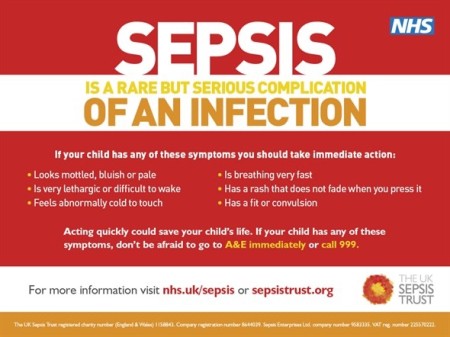
Sepsis is a rare but serious complication of an infection. If your child has any of these symptoms you should take immediate action:
- looks mottled, bluish or pale
- is very lethargic or difficult to wake
- feels abnormally cold to touch
- is breathing very fast
- has a rash that does not fade away when you press it
- has a fit or convulsion
Acting quickly could save your child's life. If your child has any of these symptoms, don't be afraid to go to A&E immediately or call 999.
A recent pilot to identify patients in Scunthorpe and Grimsby with the deadly infection sepsis has been so successful it will be roll out across Lincolnshire.
The initial six month pilot in conjunction with Northern Lincolnshire and Goole NHS Foundation Trust (NLaG), saw 20 paramedics across North and North East Lincolnshire trained to administer an antibiotic injection to their patients who were assessed as having possible sepsis. 90 patients received the treatment at the scene of the emergency. This meant they received potentially life-saving treatment 70 minutes sooner than they would have previously. To learn more about the patients experience please visit our news page.
Lincolnshire is the first area of East Midlands Ambulance Service (EMAS) to go live with this approach and all 270 Lincolnshire paramedics are now being trained how to recognise patients with sepsis shock so they can administer the IV antibiotics.
Jon Chippendale, Clinical Development Lead at EMAS said: “For a patient in septic shock, early antibiotic treatment is their best chance of survival. We are confident that our ambulance clinicians can recognise patients in or approaching septic shock and swiftly and safely administer antibiotics at the earliest opportunity. By encouraging our paramedics to think sepsis and providing them with training and interventions we have been able to improve the outcome of patients.”
The life-saving treatment is possible due to the collaborative work with NLaG, United Lincolnshire Hospitals Trust (ULHT) and Pathlinks Microbiology.
Sepsis is time critical infection. It leads:
- to shock,
- multiple organ failure and
- death if not recognised and treated early.
- With septic shock, the sooner antibiotics can begin working on the infection, the greater the chances of the patient surviving. When a person is in septic shock, their chance of survival decreases by 7.6 per cent for every hour an IV antibiotic is not given.
Spotting the signs and symptoms of sepsis and receiving early intervention can save lives. More information can be found on the NHS Choices website.
We are now in conversations with acute trusts in other counties in the East Midlands to roll out the training.
